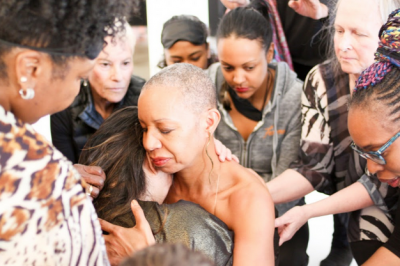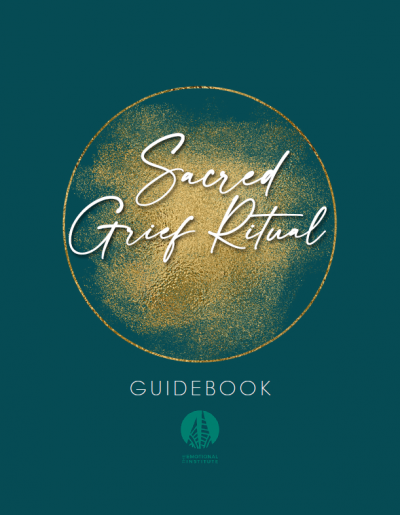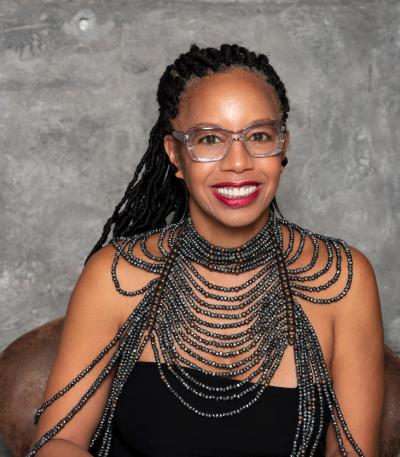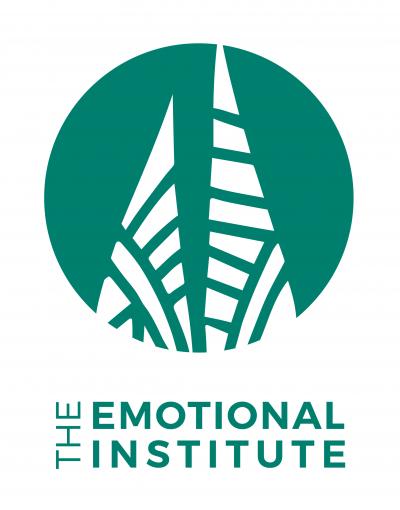Have You Grieved Enough Today?
By Bernadette Pleasant
Putting our attention on grief allows it to get the attention it deserves. And when grief is honored and expressed, it dissipates, creating space for more to come in: more love, more life, more creativity, more joy.
— Bernadette Pleasant
 Many years ago, a friend told me how sad she was that she didn’t have her mom around anymore. Her mom had died earlier that year and she missed their regular phone calls and visits.
Many years ago, a friend told me how sad she was that she didn’t have her mom around anymore. Her mom had died earlier that year and she missed their regular phone calls and visits.
As I listened to her describe her experience, I realized I was going through the same thing. But I was confused: my mom was still alive. How could I be experiencing grief? Isn’t that experienced only when someone close to you dies?
But ever since I had divorced my husband and been disfellowshipped from my religion, my mom was gone from me. And as my friend vividly described how her chest hurt so much sometimes she thought it would explode, and other times how the sobs overwhelmed her in the midst of traffic or a business meeting, I began to see how I had been mistaken. Grief was more than just a response to death.
I was curious to learn more about grief. I was also terrified that if I acknowledged the heartache I had, I would literally die.
My heartache was immense. For quite some time after my divorce, my life felt extremely empty. At first, I filled the void with shopping. I racked up some serious credit card debt. I had never lived alone and couldn’t stand the silence in my small apartment, so I left the television on all the time.
But the only thing these behaviors served to do was to numb me out. They kept the grief at bay just enough so that I could keep living a shell of a life.
Slowly, my insatiable curiosity helped me overcome my terror. I began to seek out information on grief. I came across the quote, “Grief is love with nowhere to go,” and realized how true that was. I had so much love that used to have places to go but now all of those people and places no longer existed in my life. I no longer went over to my mom’s house for weekly family dinners. I was no longer invited to birthdays, weddings, anniversaries, and other celebrations. To them, I was dead.
I became aware of Sobonfu Somé’s teachings on grief. She comes from West Africa, where people engage in grief rituals on a regular basis. As I read more about her community rituals, I realized I didn’t know how to grieve. I had seen how to power through and ignore, how to tuck grief away, put on a happy face and not let people know you were grieving. I didn’t know how to be compassionate with my heart, which just wanted to love and be loved.
But those coping strategies of numbing out and ignoring my grief were stopping me from moving forward in life. I decided it was time to learn how to grieve.
I was so nervous before attending my first grief ritual. I thought I might throw up. I was afraid to admit to a room of strangers that I was grieving. But I couldn’t keep living this half-dead life of misery. So I walked into that room and took off my mask.
The experience was like none other...
We were invited to share our grief with a partner: speak it quietly or loudly, put to words the ocean of grief we felt or just let the sobs come.
My body shook with grief and I had moments of fear that the waves would drown me. And yet... as I was witnessed and held in my grief, the tears took on a different quality. Initially they were riddled with heaviness and despair. But then they began to take on a cleansing quality. My body shifted and I went from a bent-over place of sobbing to standing, chest open, feeling free of a heavy weight.
I began to breathe deeper than I had in years. I slowly started to see grief not as something overwhelming but as something I could exist with and not be consumed by.
I also discovered how, when we make time and space for our grief, and let it move us, we also make space for new energy and new life.
After that first grief ritual, I went on to participate in others. Just like I’d hungered for freedom in my body, I now hungered for freedom in my life. I knew that the only way forward was through my grief. I was no longer willing to wear a mask and say, “I’m fine.” Instead, I became more courageous and was willing to admit that I was grieving.
Over time, my life changed dramatically because I was willing to give grief the attention that it deserves. I was able to have more love in my life again. More creativity. More joy. More intimate relationships.
And for the past several years, I’ve facilitated Grief Rituals, both in person and online, for hundreds of people. These rituals are a place to gather with community. A safe space to bring your melancholy, low spirits, depression*, and grief. Together, we honor, welcome, and make room for grief.
In the very first grief ritual I experienced, the only words my partner was allowed to say to me as she witnessed my grief was, after I thought I was done, “Have you grieved enough?” This was the way of the ritual: to let us know it was okay to keep grieving if there was more grief to be expressed. It wasn’t said as a judgment, but as an invitation.
 In our modern world, we have not been taught how to grieve. Grief, death, and loss are considered taboo topics. Not only that, but grief, if acknowledged at all, is considered a private matter, to only be experienced alone.
In our modern world, we have not been taught how to grieve. Grief, death, and loss are considered taboo topics. Not only that, but grief, if acknowledged at all, is considered a private matter, to only be experienced alone.
But when we don’t grieve, we end up living numbed-out, half-lived versions of our lives. And when we only grieve alone, we miss out on the support and healing available to us when we grieve in community.
I invite you to join us at an upcoming Grief Ritual and discover for yourself how grief — when expressed and witnessed by a compassionate community – can be healing and transformative.
Click here for more details about our upcoming Grief Rituals, including a virtual Community Grief Ritual on Sunday, April 25, at 1:00pm Pacific.
*If you’re struggling with clinical depression, please seek medical attention.
 Intoxicating and energetic, Bernadette Pleasant is a fiery and sensual speaker, somatic healer, and creator of The Emotional Institute , 400 Years: Unlearning Racism ... and Femme!, a mind-body wellness program. She has spent a lifetime exploring creative visualizations and celebrations of the human form, from sensual dance to somatic healing. A gifted healer, dancer, and entrepreneur, she channels her personal journeys and her radical empathy into transformative, immersive experiences that empower and celebrate people of all genders, ages, sizes, and fitness levels. Bernadette travels globally empowering all through classes, private workshops, retreats, and conferences.
Intoxicating and energetic, Bernadette Pleasant is a fiery and sensual speaker, somatic healer, and creator of The Emotional Institute , 400 Years: Unlearning Racism ... and Femme!, a mind-body wellness program. She has spent a lifetime exploring creative visualizations and celebrations of the human form, from sensual dance to somatic healing. A gifted healer, dancer, and entrepreneur, she channels her personal journeys and her radical empathy into transformative, immersive experiences that empower and celebrate people of all genders, ages, sizes, and fitness levels. Bernadette travels globally empowering all through classes, private workshops, retreats, and conferences.
With certifications in Emotions-Centered Coaching, Nia Technique, Nia 5 Stages, Ageless Grace, Pole Dance, Somatic Healing, Reiki, and Integrated Energy Therapy — and studies in African, Tribal, and Free Dance — Bernadette promotes emotional freedom through movement and empowerment.
 Bernadette regularly leads discussions on emotional healing, grief rituals, inclusive movement, and empowerment for all. Her authenticity, charisma, and warmth allow her to empathize with and inspire those ready for a journey of emotional exploration and affirmation. Intuitive and engaging, Bernadette is a vibrant, sensual speaker who connects with those who have been silenced and shut down to support their physical, emotional, and healing journeys — whether in a classroom, from a podium, or one-on-one.
Bernadette regularly leads discussions on emotional healing, grief rituals, inclusive movement, and empowerment for all. Her authenticity, charisma, and warmth allow her to empathize with and inspire those ready for a journey of emotional exploration and affirmation. Intuitive and engaging, Bernadette is a vibrant, sensual speaker who connects with those who have been silenced and shut down to support their physical, emotional, and healing journeys — whether in a classroom, from a podium, or one-on-one.
Bernadette, a woman of color, comes from a long line of natural healers who have used touch and movement to help others find peace, empowerment, and wellness. Her classrooms welcome participants without judgment, and support their paths to finding comfort in their own skin. In the Femme! experience, Bernadette creates a safe space for all ages, backgrounds, body types, and dance skills to explore their sensual selves. Everyone is empowered to fully embrace and embody all of their emotions and fully express them through movement; joy, sorrow, rage, ecstasy, and more are all welcome at Femme! In Femme! everyone is infused with the affirmation, “It’s your body; you can do whatever you want with it — including love it unapologetically!”
Catalyst is produced by The Shift Network to feature inspiring stories and provide information to help shift consciousness and take practical action. To receive Catalyst twice a month, sign up here.
This article appears in: 2021 Catalyst, Issue 6 - Somatic Movement Summit



